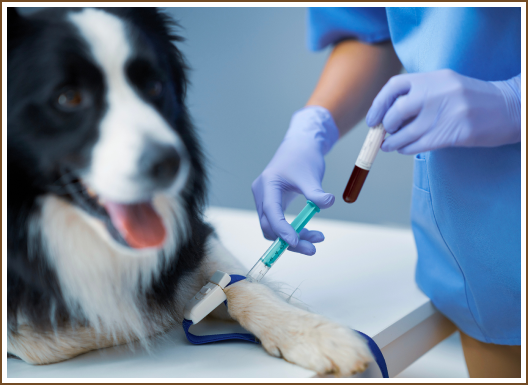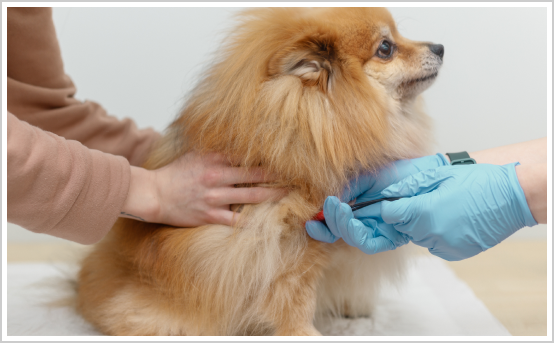
If visits to your vet haven’t yielded conclusive results, it may be time to take your pet to a dermatology specialist. While general practitioners are more treatment-based, animal dermatology experts rely more on diagnostics.
At Animal Dermatology Specialists of Vancouver, our specialists are adept at conducting thorough evaluations and providing accurate diagnoses for your pet's allergies. Instead of just addressing symptoms, we focus on identifying the root cause of the problem and developing a proactive treatment approach to prevent future allergy occurrences.

Types of Allergy Testing
To test for pet allergies, a small sample of the suspected allergen is placed below or under the skin to determine whether it will produce a reaction. There are three different types commonly administered.
- Intradermal skin testing:
The test involves applying a solution containing the allergen to your pet's skin, followed by a series of intradermal needle injections to help the solution penetrate below the skin. If a raised, red, itchy patch develops, it confirms the presence of the allergy. - Blood Testing:
This type of testing searches for substances in the blood known as antibodies. It is not as sensitive as a skin test but is generally used for animals who cannot have one.
Allergy Testing for Pets

Allergy Testing in Cats
Cat allergy tests identify allergens causing their symptoms. Cats undergo skin and blood tests to determine what triggers an allergy.
Skin tests involve injecting small amounts of allergen under the skin and looking for a reaction. If your cat is allergic, redness or a bump appears at the injection site (typically within 20 minutes). Skin tests are more accurate as they allow testing for a broader range of allergens.
Blood tests involve taking a sample of your cat’s blood and sending it to a lab for analysis—the lab searches for specific antibodies that indicate an allergy to a substance. Blood tests are preferred in instances where a cat allergy skin test may be impractical.
Allergy Testing in Dogs
To effectively address the issue, the first step of a dog allergy test is to rule out any emotional or medical conditions that could be causing similar symptoms. While many situations can mimic allergic reactions, it's crucial to be cautious with treatments to avoid exacerbating the problem.
Testing can also begin with an ear swab or gentle skin scrape to examine for yeast, mites, bacteria, or additional abnormalities. Blood work eliminates thyroid conditions; your expert may conduct other diagnostics to rule out potential causes.
A dog food allergy test will usually involve a food trial. Your dog may be put on a strict food diet, eliminating potential triggers for one to three months.

Treatment Options Post Allergy Testing for Your Pet
Managing your pet's allergies requires a tailored approach based on the specific triggers identified through pet allergy testing. An animal dermatologist plays a crucial role in diagnosing these allergies and recommending effective treatment options.
From food and flea allergies to environmental sensitivities, the specialists at Animal Dermatology Specialists of Vancouver can create a personalized treatment plan that ensures your pet’s comfort and well-being.
Treatment options include:
Food Allergies
Symptoms
Common symptoms of food allergies in pets include itchy skin, gastrointestinal issues such as vomiting and diarrhea, chronic ear infections, and excessive scratching or licking.
Treatment Options
The primary treatment for food allergies is an elimination diet, where the suspected allergen is removed from the pet's diet. This often involves switching to hypoallergenic food or using a new protein source that the pet has not previously been exposed to.


Flea Allergies
Symptoms
Flea allergies are marked by intense itching, hair loss, the development of “hot spots” (areas of inflamed, infected skin), and overall skin irritation. These symptoms are caused by an allergic reaction to flea saliva.
Treatment Options
To effectively combat flea infestations, it is important to prioritize rigorous flea control measures. This can involve using topical treatments, oral medications, or flea collars consistently throughout the year. In addition, maintaining a clean environment for your pet by regularly vacuuming and washing their bedding is essential for reducing flea populations.
Environmental Allergies
Symptoms
Environmental allergies are triggered by airborne allergens such as pollen, mould, and dust mites. Symptoms include itchy and inflamed skin, ear infections, and excessive licking or scratching, particularly around the paws, face, and abdomen.
Treatment Options
Treatment options for environmental allergies often include Apoquel, Cytopoint injections, or more advanced treatments to manage symptoms. Immunotherapy, which involves administering allergy shots or drops, is a longer-term treatment to desensitize the pet to specific allergens.
Additionally, owners can:
- Bathe their pet using pet allergy shampoos
- Monitor allergy/pollen count
- Regularly clean the house
- Use skin creams/ointments for flare-ups
- Provide allergy/skin supplements (probiotics/omega fatty acids)
- Use antihistamines
- Wipe your pet’s stomach and paws after a walk to remove allergens and pollen.

Get Your Pet’s Allergy Test Done with Expert Vet Dermatologists
Regarding pet allergies, it is advisable to consult with an animal dermatologist for better results. At Animal Dermatology Specialists of Vancouver, we have the knowledge and equipment to provide more accurate diagnostics as we seek to uncover the source. We aren’t interested in minimizing or treating symptoms — we search for the root cause.
This search for the truth enables us to treat your pet’s allergies better and prevent them from recurring.
Contact our office at 778-743-9611 to book a free consultation or complete our online form. Your pet’s wellness is a simple step away.

